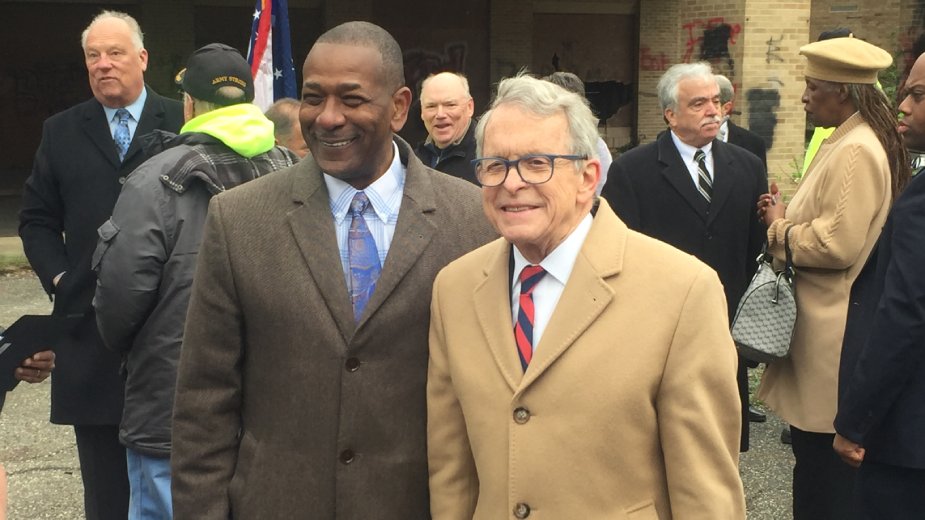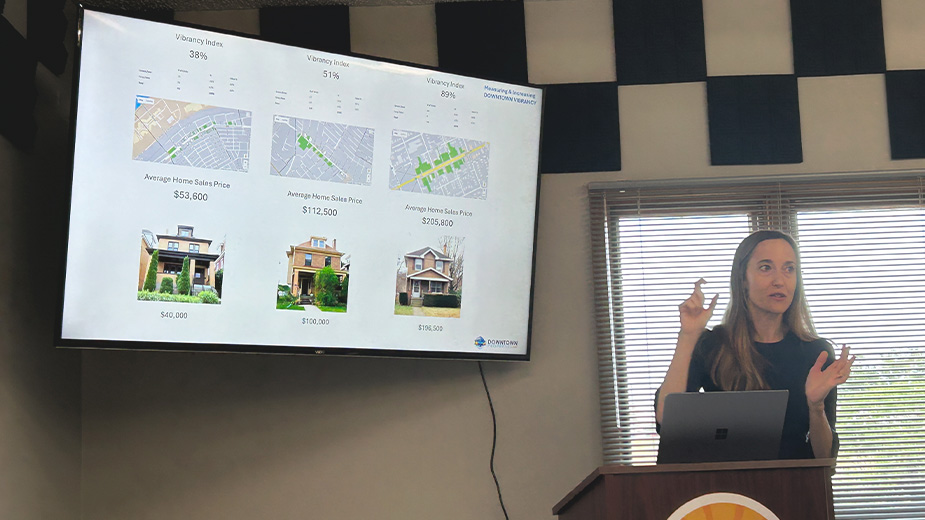Residents Applaud Plans to Demo Former St. Joe’s Hospital
WARREN, Ohio – Larry Larson, a former councilman who has lived on the city’s west side for most of his life, is finally seeing years of his work in the community paying off.
More than two decades ago, the most dominant feature in this section of the city, St. Joseph Riverside Hospital along Tod Avenue, shut its doors and has remained vacant since. As the massive building and 15-acre campus fell into disrepair, Larson and others in the neighborhood began to agitate for its demolition.
“I’d bug them all the time,” Larson says of city officials, who were hamstrung over the years because of legal battles with subsequent owners of the property and the immense costs it would take to demolish the former hospital.
All of that changed Wednesday as Gov. Mike DeWine formally announced during a press event at the site that the state of Ohio would allocate $3.4 million in Brownfield redevelopment grant monies to help raze and remediate the structure. The latest round of funds is in addition to another $2.5 million the state awarded the project last year.
Larson, today the president of the Northwest Neighborhood Association, said the site has consistently been vandalized and stripped of materials inside and out. Windows are shattered, a mold-infested couch sits in an entranceway that once accepted patients, and the word “spooky” in spray-painted black graffiti is scrawled across the concrete in several places outside the vacant building.
Meanwhile, bad actors have used the neglected site as a dumping ground, Larson remarked. “They’ve used it for tires, garbage,” he said. The installation of concrete barriers did little to prevent additional vandalism over the years, and in one instance impeded efforts of firefighters to combat a blaze that broke out at the site several years ago, he said.
“Money held everything back,” Larson said of the effort to raze and remediate the property. “The mayor and everyone else will be happy when this is done because I won’t be bugging them.”
On Tuesday, DeWine’s office announced $60 million in Brownfield remediation grants to more than 78 projects across the state.
“The hospital had its great days,” DeWine told reporters at the site Wednesday. “But, this has been a real problem for the community and the city.”
In the past, the state has appropriated funds to communities to demolish vacant residential properties that have blighted neighborhoods, DeWine said. This program, he emphasized, is specifically directed to larger, more complex projects such as the former St. Joeseph’s.
“We have buildings like this across the state of Ohio, every legacy city has them,” the governor said. However, these cities do not have the financial resources to cover the costs of not just the demolition, but also the environmental cleanup associated with older sites. “It costs so much money because of remediation – you have to deal with asbestos sometimes,” he said. “Cities don’t have the ability to come up with that kind of money.”
The entire Brownfield program totals $350 million, DeWine said, and the projects announced this week represent just $60 million of that funding bucket. Additional projects should be announced in the coming weeks, he said, including potential cleanup sites in Mahoning County and Youngstown.
“We’ve got a long way to go with this,” DeWine said. “This is really going to help.”
Funding for the program was approved by the Ohio General Assembly and is sourced from the state’s general fund, the governor added.
St. Joseph Riverside Hospital’s first building was constructed during the 1920s and expanded into several buildings on 15 acres. Several guests attending the press event had once been treated at the hospital.
“I was born here,” said state Rep. Michael O’Brien, D-Warren, as were a sister and brother, he recalled.
The hospital closed in 1996 after Mercy Health – then named Humility of Mary Health Partners – acquired Warren General Hospital on Eastland Avenue. The former St. Joe’s was sold several times with none of the owners developing the site. In 2015, foreclosure proceedings were initiated against the building’s owner at the time and, in 2019, the state took possession of the property.
Last year, the state transferred the property to the Trumbull County Land Reutilization Corp., or the Trumbull County Land Bank. The demolition and remediation funds were allocated to the land bank.
The city’s consultant on the project, Mannik Smith Group, is currently reviewing eight bids submitted by contractors. The project was initially estimated to cost about $5 million, according to Warren Community Development Director Mike Keys.
Mayor Doug Franklin said that he expects to have the work under contract within a month and the building down by the end of the year.
“Thank God it’s coming down,” Franklin said, adding that it was fortunate no one was injured or killed in the condemned building.
Short-term plans for the site include a landscaped green space replete with new lighting, benches and walking paths along the Mahoning River, the mayor said.
However, long-term plans for the property won’t be determined without the input from nearby residents, Franklin added.
“We’re going to work with the community to get some development opportunities,” the mayor noted, suggesting the potential of new housing and light retail establishments.
“But whatever we do, it has to fit with the integrity of this neighborhood,” Franklin said. “They deserve to have their say on what goes here.”
Pictured at top: Warren Mayor Doug Franklin joins Governor Mike DeWine at the site of the upcoming demolition.
Copyright 2024 The Business Journal, Youngstown, Ohio.



